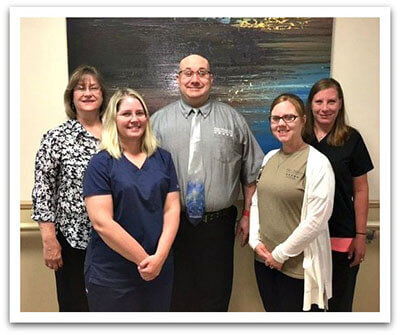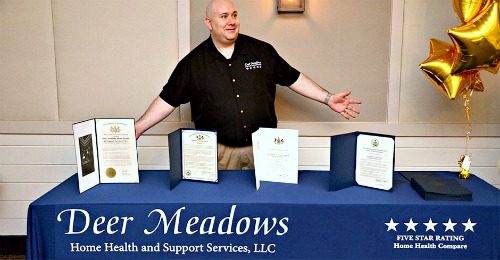What does it take to build a five-star home health agency? Wound care education – and a credentialed staff – are a big part of it.
We know how wound care education helps transform the careers and lives of individuals. We also know that it can positively affect entire facilities, make a difference in communities, and drastically influence the lives of patients and professionals. That’s why we love to share success stories when we hear them.
Take, for example, Deer Meadows Home Health and Support Services, LLC (DMHHSS), a five-star nonprofit (and stand-alone) home health company in Philadelphia. It is known for excellent care, an exceptional staff, and wound care education advocacy. But it didn’t happen overnight. It did happen, however, with very specific goals in mind: to heal patients and treat them like family; forge relationships; and promote wound care education.
A Nurse Is Born
When did Stanley A. Rynkiewicz III decide to be a nurse? It was in high school during what was supposed to be a carefree Senior Week. One of his best friends suffered from a spontaneous pneumothorax (collapsed lung) right in front of him, and he helplessly stood by as an emergency medical team came to the rescue, inserting a chest tube and saving his friend’s life.
It also happened to be in the middle of a national push to promote the field of nursing – especially male nurses. And with that, Stanley knew what to do. “I saw first-hand the need for people to give back through the health care system, and that was it for me,” he said.
Today, Rynkiewicz, RN, MSN, WCC, DWC, NHA, is the administrator (and founder) of DMHHSS, and works with a staff of over 150 (including nurses, therapists, aides and support staff) in this premier agency known for excellent care and an exceptional staff.
Wound Care Education at Work
As a provider of home health services, it was obvious to Stanley’s team from the beginning how significant wound care education would be. Most of their patients have chronic comorbidities, and regularly suffer from chronic wounds or open sores that won’t heal. In addition, most patients live alone and often have caregivers who don’t know how to properly care for wounds, which leads to a diminished quality of life and longer healing times.
As a result, Stanley and his Clinical Director and Assistant Administrator Irene Dudley, RN, BSN, WCC, OMS, initiated a comprehensive wound care program early on to enhance care and ensure consistency and dependability. Today, all full-time staff are credentialed, and their robust education program includes:
- Hosting WCEI® courses and a variety of training events.
- Inviting community professionals to participate and collaborate.
- Spreading the word about related activities and events, like the free diabetic foot-screening clinics they hold every year.
- Being active on social media to promote events, services and health care, and engage with radio and television stations with press releases and guest appearances.
They also stay current with new techniques and products in the industry. For example, in 2015 they implemented the use of Tissue Analytics – a software application that takes pictures of wounds and automatically measures things like chronic wounds, burns and other skin conditions.
“There is so much in wound care that doctors don’t necessarily know,” Stanley said. “Supporting our staff’s continuing education and helping them grow and learn new skills is a way to give back – to them and to the community.”

(L to R) Irene Dudley, RN, BSN, WCC, OMS, Clinical Director DMHHSS; Dawn Boggs, RN, WCC, DMHHSS Nurse Case Manager; Stanley Rynkiewicz, RN, MSN, WCC, DWC, CCS, NHA, DMHHSS Administrator; Gina Grosh, RN, WCC, HCS-D, DMHHSS Oasis/Coding Manager; and Susan Sellecchia, RN, MSN, WCC, DMHHSS Nurse Case Manager.
Investing in People
“Investing in your people is crucial,” said Stanley. “They should feel like they’re part of something .”
With a low professional staff turnover rate, Stanley credits the facility’s strong wound care program and employee advocacy. For example, his team emphasizes:
- Celebrations – Taking the time to celebrate achievements and events is important, like the party they held recently after being named a Medicare Home Health Compare five-star home health agency.
- Recognition – Point out the good things and make a big deal of them. For instance, Stanley recently asked a state representative to give each staff member an official five-star citation in honor of the agency’s status.
- Advocacy – Employees should feel important and taken care of. “I try to take care of my employees the best I can,” said Stanley. “Whatever is within my power, I advocate for them.”
Fostering Relationships
From the moment Stanley decided to be a nurse, he knew that forging and nurturing relationships would be key. “I am very passionate about what I do,” he said. “You hear horrible stories every day about how sick people – especially the elderly – are treated, whether it’s by a caregiver or an unqualified clinician. I’ve always aimed to treat all our patients just like family, with courtesy and kindness.”
Stanley also stresses the importance of developing working relationships with hospitals, and post-acute care facilities, and being involved with community organizations and healthcare initiatives. He serves on the board of the Pennsylvania Homecare Association, is very involved with WCEI®, and was awarded the WCC® Outstanding Community Outreach for the Prevention and Treatment of Diabetes-Related Wounds Award in 2008. As a former Captain in the United States Air Force, he is also involved in the Veterans History Program, funded by the Library of Congress. He and a staff member interview veterans, listen to their stories and record them for posterity.
“It’s all about giving to others,” Stanley said. “In health care, we’re talking about people’s lives. Treating other people with respect and dignity, and being there for others the way you hope someone will be there for you is what it’s all about.”
Who Are Your Wound Care Champions?
Do you know a good wound care story? Is there an individual, team or facility that is a champion of wound care you’d like to tell us about? We’d love to hear more – please leave your comments below.
To learn more about Deer Meadows Home Health and Support Services, LLC visit www.deermeadowshomehealth.org.
Wound Care Education Institute® provides online and onsite courses in the fields of Skin, Wound, Diabetic and Ostomy Management. Health care professionals who meet the eligibility requirements may sit for the prestigious WCC®, DWC® and OMS national board certification examinations through the National Alliance of Wound Care and Ostomy® (NAWCO®). For more information see wcei.net.
What do you think?

